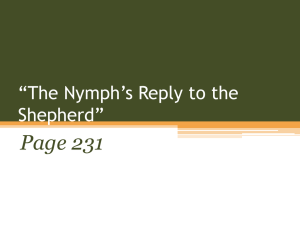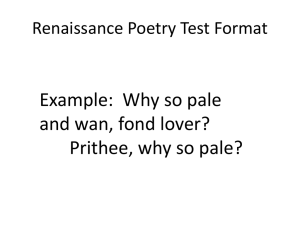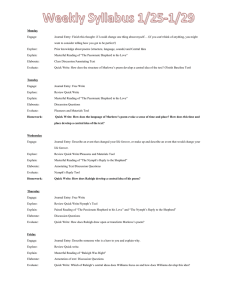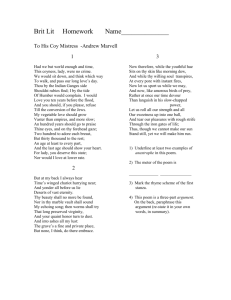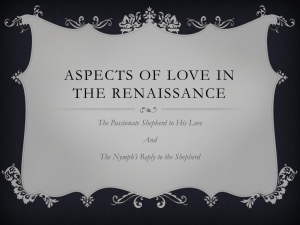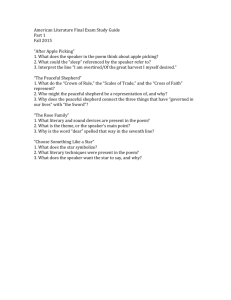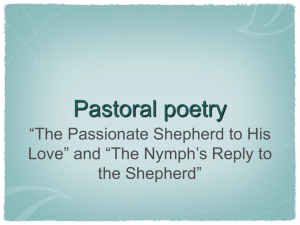http://www.columbia.edu/itc/mealac/pritchett/00generallinks/munster
advertisement
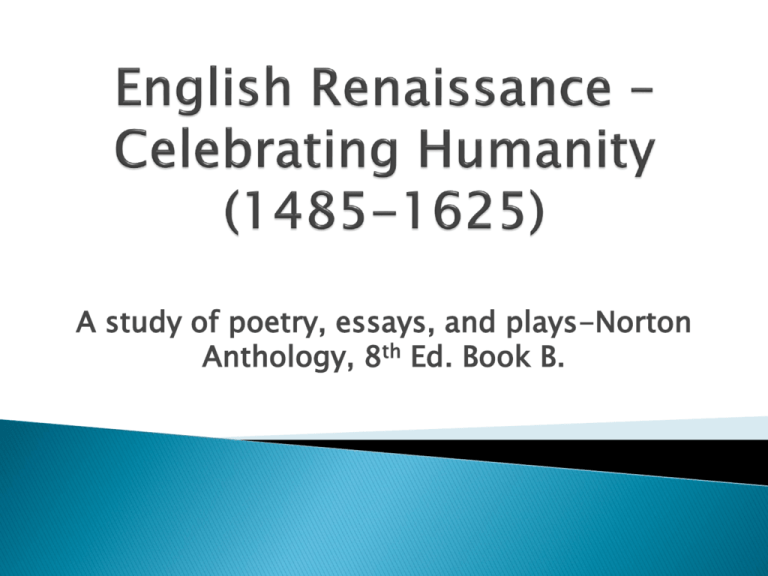
A study of poetry, essays, and plays-Norton Anthology, 8th Ed. Book B. 1517 Martin Luther breaks away from Roman Catholic and began Protestant Reformation. Literature-forum for developments in poetry, favoring lyric rather than narrative. Sir Thomas Wyatt-lyric poet, knighted in 1536. Arrested and imprisoned twice for upsetting Henry VIII (593-3). Wyatt’s poems helped to introduce the Italian sonnet form to England and English literature. Protestants were divided and brought about Calvinism (John Calvin) and Puritan beliefs Elizabethan Age brought about a cycle of Sonnets. Catherine of Aragon, 1st Wife (no sons) - divorced Anne Boleyn 2nd Wife Executed in 19 May 1536 Jane Seymour 3rd Wife – son Edward VI Died shortly after the birth of her son. Anne of Cleves 4th Wife – for 6 months, marriage annulled – Henry did not like the way she looked? Catherine Howard,5th Wife – 1540-42 beheaded accused of adultery. Catherine Parr, 6th Wife 1543- 47 – She had four husbands, Henry VIII was the third. “George Frederick Handel is the greatest composer who ever lived.” -- Beethoven (1824) http://www.gfhandel.org/ Mona Lisa – Leonardo da Vinci http://en.wikipedia.org/wiki/Sixteenth_Century http://www.luminarium.org/renlit/eliza.htm Queen Jane Seymour http://www.elizabethancostume.net/gallery/1536.html Unknown Girl 1565 http://www.elizabethancostume.net/gallery/1569.html Queen Elizabeth I, known as the Phoenix Portrait by Nicolas Hilliard C. 1575 Diagram of Henry's VIII reign relative to his marriages. Images and Timeline from: http://en.wikipedia.org/wiki/Wives_of_Henry_VIII Book of Prayer Thomas Cranmer (2 July 1489 – 21 March 1556) was a leader of the English Reformation and Archbishop of Canterbury during the reigns of Henry VIII and Edward VI. http://en.wikipedia.org/wiki/Thomas_Cranmer Wilt thou have this woman to thy wedded wife, to live together after God’s ordinance in the holy estate of matrimony? Wilt thou love her, comfort her, honor and keep her , in sickness and in health? And forsaking all other, keep thee only to her, so long as you both shall live? Wilt though have this man to thy wedded husband, to live together after God’s ordinance in the holy estate of matrimony? Wilt thou obey him and serve him, love, honor, and keep him, in sickness and in health, and forsaking all other, keep thee only unto him, so long as you both shall live? “Sir Thomas Wyatt (1503 – 11 October 1542) was a 16thcentury English lyrical poet. He was born at Allington Castle, near Maidstone in Kent though his family was originally from Yorkshire”. http://en.wikipedia.org/wiki/Thomas_Wyatt_(poet) 1520’s Catholic Authorities – attempt to censor and burn all copies of New Testament (English translation by William Tyndale) Protestant Reformation – began with Martin Luther, challenged authority of Pope 1517 French theologian John Calvin, broke away from Catholic church – “emphasized the obligation of governments to implements God’s will in the world…God adopts some to hope of life and sentences others to death” (Norton B 616). T- Title *ponder the title before reading the poem P - Paraphrase *Translate the poem into your own words C - Connotation *Contemplate the poem for meaning beyond the literal (also relate to historical, social and cultural influences) A – Attitude *Observe both the speaker’s and the poet’s attitude (tone) S - Shifts *Note shifts in speakers and in attitudes T - Title *Examine the title again, this time on an interpretive level T - Theme *Determine what the poet is saying Farewell, Love, and all thy laws forever, They baited hooks shall tangle me no more; Senec and Plato call me from thy lore, To perfect wealth my wit for to endeavor. In blind error when I did persever, Thy sharp repulse, that pricketh aye so sore, Hath taught me to set in trifles no store, And ‘scrape forth since liberty is lever. Therefore farewell, go trouble younger hearts, And in me claim no more authority; With idle youth go use thy property, And thereon spend thy many brittle darts. For hitherto through I have lost all my time, Me lusteth no longer rotten boughs to climb. I find no peace, and all my war is done, I fear and hope, I burn and freeze like ice, I fly above the wind, yet can I not arise, And naught I have, and all the world I seize on. That looseth nor locketh holdeth me in prison, And holdeth me not, yet can I ‘scape nowise; Nor letteth me live nor die at my devise, And yet of death it giveth me occasion. Without eyen I see, and without tongue I plain, I desire to perish, and yet I ask health; I love another, and thus I hate myself; I feed me in sorrow, and laugh in all my pain. Likewise displeaseth me both death and life, And my delight is causer of this strife. What makes tone or mood? Word choice, figurative language, imagery and sound effects… Love’s Logic – The invitation to Love is an old poetic tradition and very common in Renaissance England. Journal Response: What current love songs can you think of—in any popular music style that is sung by an impatient suitor to a specific lover who has not quite committed herself/himself—or not the way the singer wants? What are the lyrics? How is love treated in popular music today? “The Passionate Shepherd to His Love” This poem is part of two literary traditions. Carpe Diem – literally means to “Seize the Day” and in a literary theme, urges living in the present moment, especially in pleasurable pursuits. Pastoral – works set in an idealized countryside with characters which blend with the naïve and sophisticated This poem was set to music and several poets have written answers to it. In what ways is the speaker offering the suggestion to “seize the day”? He is offering many “delights” to tempt his love in the hope that she will spontaneously go with him. Summary: Complete TP-CASTT “Come live with me” urges the shepherd to his love. He describes some of the pleasures of the country that he and his love will enjoy and list the things he will make for her, including a cap of flowers and slippers with gold buckles. He promises that shepherds will dance and sing for her delight each May morning. Hearing Sight Smell Touch Classroom Activity: Create a chart listing the senses of hearing, sight, smell, and touch. As you read Marlowe’s famous pastoral on poem, list under each heading the details that appeal to each of the senses. Hearing Sight Smell Touch Shallow rivers Gown Roses Rocks Waterfalls Gold buckle Fragrant posies Finest woo Birds Rocks Lined slippers Describe the life that the shepherd envisions with his love. How will they be dressed? How will they spend their time? The speaker envisions a life of care-free pleasure. The speaker will make his beloved beds of flowers, a cap of flowers, a gown embroidered with myrtle leaves, a gown of finest wool, lined slippers with gold buckles, a belt of straw and ivy buds decorated with coral and amber. The couple will sit on rocks watching shepherds dance and sing. Listen to Thomas Tallis, English Renaissance music. Raleigh’s reply to Marlowe’s “Passionate Shepherd” Other poets also responding to Marlowe’s poem – John Donne, Robert Herrick Raleigh response was considered the best and “his speaker is identified as a ‘nymph,’ which mean a young woman—like her creator, she has a strong character. Performing a Dramatic Reading – (Tone) Select a partner (preferably Male/Female) Read Marlowe’s poem first, then read Raleigh Imagine yourself as the characters and ask yourself these questions: 1) Does the shepherd really think he can convince the nymph with his argument? 2) Does the nymph think that the shepherd believes she would be convinced? Enactments Summary: In “The Nymph’s Reply to the Shepherd” the clever nymph says that not every shepherd tells the truth. She then responds to the pleasures and gifts the shepherd offers by painting a realistic view of each one. For example, she says rivers rage and flowers fade. She ends by saying that she might be moved to be the shepherd’s love if youth and love lasted forever. The Renaissance – Theater English writing and performing plays for several centuries Early theater – church ceremonies dialogue and songs --From Church to towns – 1300 – 1400 --Less Religious to drama/comedy Performances- ritualistic, moral message, changing to: miracle, mystery plays, messages on how to live and die New Theaters, The Globe (Wooden O) James Burbage partner with William Shakespeare. 1st theater – The Theater 2nd theater – The Curtain The Tragedy of Othello is based off stories written by Giraldi Cinthio and published in Venice in 1566. Costumes and stages decorated colorfully and eloquently Audiences expected variety of entertainment: Dialogue, Music, and Singing Othello is from the Shakespeare’s Tragedy series: Hamlet 1600 – 1601 Othello 1601 – 1602 King Lear 1605 Macbeth 1605 – 1606 Anthony & Cleopatra 1606 – 7 “Shakespeare's comedy, "Twelfth Night,” shares much with our era's "Harry Potter" and "Forrest Gump". It is a wildly improbable, hugely entertaining fantasy. And just beneath the surface are life's darkest, most terrible truths”. http://www.william-shakespeare.info/shakespeare-play-twelfth-night.htm Themes: Love/hate Fate/freedom Interracial marriage Disobedience/abandonment Innocence/guilt Loyalty/Trust/Guilt/Denial Revenge Death http://www.columbia.edu/itc/mealac/pritchett/00generallinks/munster/italy/aa_italy.html http://www.columbia.edu/itc/mealac/pritchett/00generallinks/munster/italy/aa_italy.html http://www.columbia.edu/itc/mealac/pritchett/00generallinks/munster/italy/aa_italy.html
